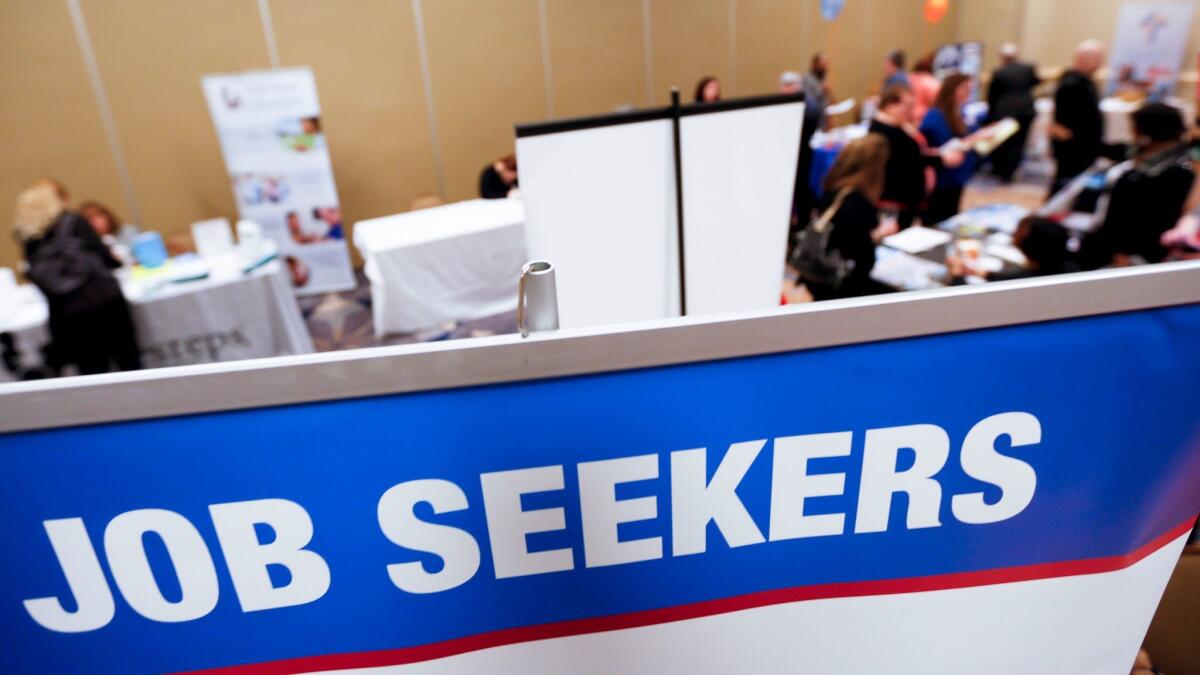Opinion: President Trump is lucky to be riding a better economic wave than his predecessors caught

- Share via
How are President Trump’s first 100 days different from those of his last three predecessors? Oh, there are so many answers to that question. But here’s one that’s substantive, not merely stylistic: Trump is starting his term with the economy on a sustained upswing.
The question is whether he’ll capitalize on that advantage.
Bill Clinton, George W. Bush and Barack Obama can only wish they had been so fortunate. Ronald Reagan too. We all remember the smoldering wreck that Obama inherited after the housing bubble burst and Wall Street choked on the artificially valued securities it had been feeding itself. But a previous asset bubble burst just before W. took office, causing a recession that lasted from his third month in office until his 11th.
The economy wasn’t technically in a recession when Clinton took office — that downturn officially lasted from July 1990 through March 1991 — but unemployment remained high and growth sluggish through his first year. Reagan, meanwhile, saw the country slip into recession in July of his first year, while the Federal Reserve was still clamping down on the money supply to bring inflation under control.
By contrast, Trump is riding a wave of private-sector hiring and a booming stock market. Friday’s jobs report for February, Trump’s first full month in office, showed a healthy 235,000 increase in the “nonfarm payroll employment” category — not quite as high as in Obama’s final month or in last summer’s surge, but still strong. Average wages notched another month of growth, continuing a two-year trend.
Presidents are quick to take credit for economic growth while blaming recessions on forces beyond their control (such as the bad policies of their predecessor). The truth is more nuanced than that, of course. Policies do have an effect, especially when they raise or lower the supply of workers and job skills, the cost of capital, the incentive to expand operations and the incentive to work. But those take time to be implemented and work their way through an economy the size of the United States’.
The one thing that Trump can legitimately argue is that he’s changed the expectations of investors and employers, which is encouraging them to bet on future growth. That’s a good thing, provided that Trump follows through. The optimism appears to be based mainly on the hope that corporate tax rates will be cut and costly regulations will be rolled back. Trump and the GOP-controlled Congress have started delivering on the latter, but the former is waiting for lawmakers to finish work on another major promise by Trump — repealing and replacing Obamacare.
A House GOP leadership bill to fulfill that promise is racing through that chamber, but don’t confuse speed for viability. It’s a deeply flawed proposal that’s not likely to deliver on its signature promise — reducing insurance rates — and that faces stiff opposition from GOP conservatives, GOP moderates and Democrats of every stripe.
The time and political capital that Obama and congressional Democrats spent on healthcare in 2009 and 2010 undermined their ability to deliver what voters wanted most — a faster-growing economy. And the party paid dearly for it in the 2010 elections. It would be richly ironic if Republicans’ fixation on repealing and replacing Obama’s signature healthcare law would stop them from delivering what the markets are counting on to keep the economy moving in the right direction.
Twitter: @jcahealey
More to Read
A cure for the common opinion
Get thought-provoking perspectives with our weekly newsletter.
You may occasionally receive promotional content from the Los Angeles Times.











